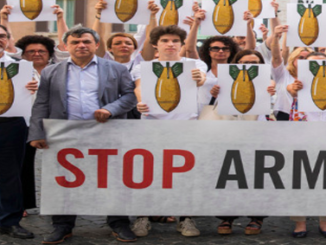
Italian student ‘Regeni’ was killed by Egyptian security forces, yet no one was blamed
Italy has let its ambassador take up his post in Cairo, citing on Monday progress by Egypt in the investigation of the 2016 torture death of an Italian scholar that had weighed on diplomatic ties.
Italian Foreign Minister Angelino Alfano said the move does not mean Italy intends to ease the pressure on Egyptian authorities to bring Giulio Regeni’s killers to justice. The ambassador will bear a letter asserting the Italian government’s determination to discover the truth about the murder, Alfano said.
Ambassador Giampaolo Cantini “will have the task of contributing, via contacts with Egyptian authorities, toward reinforcing judicial cooperation, and, as a consequence, the search for the truth,” Alfano said in a statement.
Regeni was a Cambridge University doctoral student researching labor movements in Egypt when he was abducted in Cairo in January 2016. His body was found along a Cairo road a few days later bearing marks of extensive torture.
Italian news agency ANSA said Italian and Egyptian prosecutors issued a joint statement pledging to find the “truth and all the circumstances that led to the abduction, torture and death.”
Italian state TV said Egypt has sent Italian prosecutors transcripts of fresh questioning of Egyptian police officers who had a role in investigating Regini’s death. Egypt also assured Italy it would provide video surveillance footage from cameras at the Cairo subway stop where Regeni was known to have been last seen alive.
In April 2016, the then-ambassador was recalled to Italy for consultations, to highlight the Italian government’s frustration with Egyptian investigators. Since then, that ambassador was assigned elsewhere, and the embassy in Cairo awaited its ambassador.
Regeni disappeared on a day Cairo police were on a tense watch for protests on the fifth anniversary of the 2011 popular uprising.
After his body was discovered, Egyptian authorities offered various explanations, including an assertion that Regeni had been hit by a vehicle. Later, they said he was a victim of a robbery.
Egypt is considered a key ally both in international efforts to combat Islamist-terrorism as well as efforts to stabilize neighbor Libya, a base for human traffickers who have sent hundreds of thousands of migrants by sea toward Italy in the last few years.
In a statement, Alfano dismissed any suggestion that Italy’s desire to slow the flow of migrants across the Mediterranean Sea had triggered dispatching the ambassador to Cairo.
“That Egypt is an inescapable interlocutor on issues of primary importance for Italy, like the stabilization of Libya and the fight against terrorism, doesn’t signify that Italy intends to turn the page in the search for truth in Giulio Regeni’s murder,” the minister said.
Regeni’s family has been outspoken in demanding that Italy insist on getting the truth from Egypt. His mother has said her son’s face was so badly pummeled the only facial feature she could recognize was the tip of his nose.
Italian state TV said Monday night the family was indignant that the ambassador was allowed to go to Cairo.
Egyptian police investigated Regeni before he disappeared
Cairo police investigated Giulio Regeni for three days in January before he disappeared later in the month, Egypt’s prosecutor general said in a joint statement on Friday (Sept. 9, 2016). The statement said that the investigation started after the head of an independent union of street traders filed a petition. It said the probe lasted three days and “did not uncover any activity of interest for national security and, therefore, the investigations were stopped”.
Regeni, 28, went missing on the night of January 25, the heavily policed fifth anniversary of the uprising that toppled former strongman Hosni Mubarak, and his burned, mutilated, and partially unclothed body turned up in a ditch on the road to Alexandria on February 3.
The case has created a great deal of tension between the two countries.
Egypt has repeatedly denied its security forces were behind the torture and murder of Regeni, a Cambridge doctoral student researching Egyptian trade unions.
Egyptian authorities have offered up a series of unlikely explanations ranging from a car crash, to a gay lovers’ quarrel gone wrong, to a kidnap for ransom that turned deadly.
Italy has rejected all those versions.
In fact, there was much evidence that the Italian Ph.D. student was held by the Egyptian security forces before his disappearance before it was announced by Egypt’s prosecutor general.
According to a special report by Reuters, the Italian Ph.D. student Giulio Regeni made a Skype call from his Cairo flat to an academic in Germany, ten days before he vanished, and he sounded anxious.
Georgeta Auktor, a researcher at the German Development Institute in Bonn, where Regeni had spent a few weeks in 2015, said, “We did not talk very much as it was expected that we will catch up at some point later.”
“He said he feels he needs to be careful where he goes in the city and whom he meets.” However, they did not speak again, reported Reuters. It seems that Regeni felt that he was followed by the Egyptian security forces.
In fact, this Skype call matches what has been revealed that the mobile call logs analysis in Egypt has proved that Regeni was followed by the Egyptian security forces the day he disappeared.
A Private Italian Channel “la7” also reported that anonymous sources at the Egyptian capital said that by analysing nine mobile call logs at Regeni’s location, it was showed that “Regeni was followed from five Egyptian police officers on the day of his disappearance on 25 January 2016.”
The analysis showed that the five police officers, “were moving side by side with Regeni when he took the underground (the metro) of al-Bohous, west Cairo at almost 8 pm before he disappeared.”
The Italian Channel’s report said that the Egypt’s general prosecution, “should call the five security officers, who were following Regeni the day he disappeared, for investigations to reach the truth.”
There is more evidence ensurings the same information that Regeni was targeted by the Egyptian security forces who denied seeing Regeni before his death.
In April, 2016, Reuters published an exclusive report after interviewing intelligence and security sources who told the news agency that the police had arrested Regeni outside a Cairo metro station on Jan. 25 and then transferred him to a compound run by Homeland Security. The government and security services have always denied he was ever in custody.
It remains unclear who killed Regeni or why, “But piecing together his activity in the months leading up to his death, it is apparent that two factors put the student at risk: his passionate interest in political and economic issues and his belief that Egypt needed change.”
Regeni raised the suspicions of Egypt’s security services because he met unionists and was researching politically sensitive subjects, “as reported by Reuters based on the testimony of three Egyptian security sources.
One of the sources said, “Homeland Security had monitored Regeni with a number of opposition leaders and labor unions. He attended several meetings.”
A second security source said: “He is a foreigner and does not work in the media … and this is what made Homeland Security follow and monitor him.”
In addition, a third security source said that Regeni’s meetings were suspicious because they took place at “a time in which many nations were intervening in what is happening in Egypt.” He continued that this behavior has raised the possibility that the Italian young man was gathering information for a foreign nation.
Regeni has been searching on Egypt’s independent unions for his doctoral thesis. He was also interested in alternatives to the long-standing domination by the state and the military of Egypt’s economy. Therefore, his research study should have alarmed Egypt’s homeland security which returned more suspicious and powerful after the military coup led by al-Sisi in 2013.
Regeni’s research study was sensitive because the Egyptian military’s grip on the economy is a subject rarely issued about in a country that has been ruled almost by military men since the overthrow of King Farouk in 1952, reported Reuters.
In addition, the independent labor unions have played a major role in the industrial unrest and strikes that paved the road for the 2011 uprising that toppled Mubarak’s regime.
Academic Auktor, who is also an associate fellow at University Erlangen-Nuremberg Institute of Economics, was working with Regeni on a paper called “Developmental State in the 21st Century – Calling for a New Social Contract.” She said the Italian longed to “see the fruits of 2011. He thought a more inclusive state was necessary. He believed that the involvement of more social groups would be beneficial.”
But hopes of 2011 revolution have vanished after the military coup led by al-Sisi against Mohamed Morsi, the first democratically elected president of Egypt.
Al- Sisi, the former head of the military intelligence and Defense minister – has launched a massive crackdown against freedom of speech, expression, and political participation. The political opposition was imprisoned, protests were banned, and active laborers were arrested.
In fact, since al-Sisi military coup -independent trade unions that have flourished and emerged after 2011 Arab Spring uprising- have been fragmented.
Human Rights Watch has criticized Sisi’s government, saying it had stopped “dealing with the de-facto independent trade unions, which has led labor activists to fear that labor rights gains since 2011 are facing erosion.
International newspapers, Egyptian human rights groups and activists say that Regeni’s body carry the signs of the Egyptian security forces, which was strongly denied by security services and the government.
Human rights groups say Regeni is among hundreds of people who were forcibly disappeared in Egypt after the military coup led by Al-Sisi against Egypt’s first democratically elected President Mohamed Morsi.



